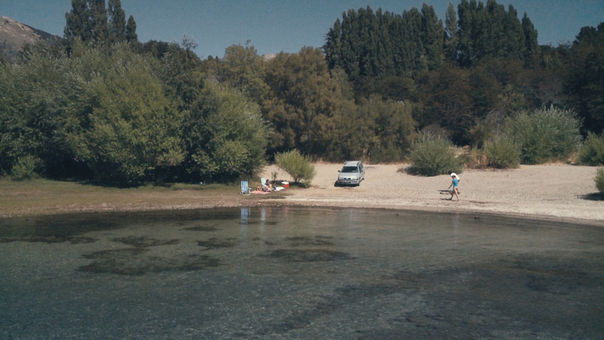Argentine Short Films Competition: four reviews
By Laslo Rojas

Los días felices by Agostina Guala (First Prize)
The beginning of the year seems ideal: a family day at the countryside, sun, a barbecue next to the lake and zero concerns. The young couple of parents carry out the tasks planned for this holiday with their many children, enjoying themselves and dancing to Amor de mis amores on the radio. Suddenly, they realize that one of their daughters is missing. The peace ends. The search for the little one destroys the serenity that the family was enjoying until that moment.
The director Agostina Guala manages to convey that feeling of everyday frustration that arises from domestic accidents like the story that serves as an excuse for this vignette. Her eye observes with attention the little details in the different relationships that are established within the family: intergenerational relationships, between genders and at different levels of authority. This is a story where the family is presented as a fixed unit, even if it is divided between feminine and masculine sides with distinct roles, well-illustrated in the final sequence: the men outside the car “peeing” and the women inside, waiting and holding hands, the necessary personal contact. A film that echoes some of Nanni Moretti’s and Abbas Kiarostami’s works.
El mes del amigo by Florencia Percia (Second Prize)
An entertaining, low profile comedy of taciturn and absurd humor, a deadpan comedy as the Americans call it. Our protagonist, Emilia, is a typical, middle-class city girl, who unintentionally starts to live the life of her apartment’s former tenant.
The fear of solitude in the midst of society, in a city so big as Buenos Aires, seems to be one of the engines of the story. Emilia is looking to get away from her ex boyfriend and the routine they had as a couple but when she fails, she finds herself in the routine her apartment’s former tenant left behind. It will always be easier to follow somebody else’s route than make one’s own. And besides, what could be more fun than pretend to be someone else?
Berlin by Luciano Salerno (Third Prize)
In a typically Argentine setting – the bar of a grill – a young couple, Clara and Julián, cigarettes in their hands, spend their last couple of hours together in the city before Clara leaves for Germany.
The resentment and love of Julián towards her is palpable. It can be felt through the constant questions and concerns about how Clara will do in Berlin, and mostly in his passive-aggressive affirmations on her wise decision to leave everything behind and start from scratch. Like we have seen many times in other films, he finally gives up and demonstrates he is weak, while she stays strong and does what she has to do. A classic situation that always works.
Un ejercicio para olvidar by Gabriel Bosisio (Special Mention)
An excellent exercise which makes use of the elements of the fake documentary, the making of, the autobiographical account (the director is also the protagonist of the film) and even of fantasy and sci-fi films, to represent a typical love story, the romance between two film actors. In 17 minutes, Gabriel Bosisio tries to count –in vain of course- those moments of happiness that every relationship has or should have, based on statistical data, and historical, natural and biological facts. Like this, he goes over the development of a romantic relationship, from falling in love to the inevitable breakup. Just like in the previous short film, Berlín, the female character is here the strongest emotionally and it might not be a coincidence that both are played by the same actress, the beautiful Malena Villa (whom, by the way, can be seen in a third short film of this competition: Pastel de cereza).
Mariángela Martínez Restrepo - Talent Press BsAs Coordinator
Clara Picasso -Text translator

